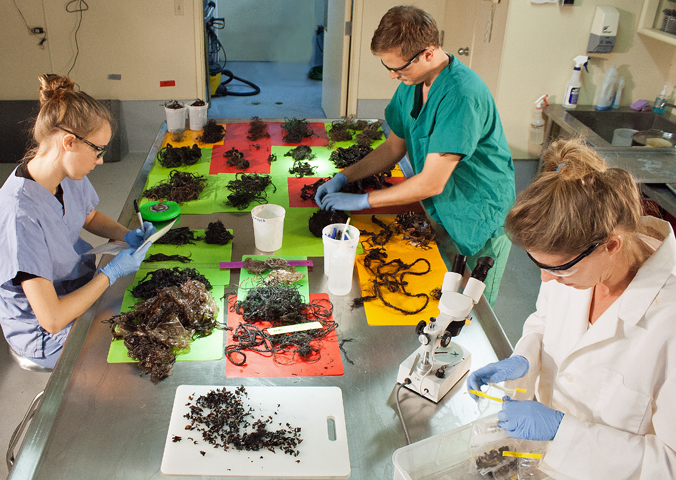
When whales and dolphins are discovered stranded in distress on Hawaiʻi beaches, the University of Hawaiʻi Marine Mammal Stranding Lab is part of the team of first responders that spring into action. The lab is part of the UH Mānoa’s Hawaiʻi Institute of Marine Biology and is the only entity in Hawaiʻi authorized by National Oceanic and Atmospheric Administration (NOAA) Fisheries Service to research cause of death in marine mammals.
“Our lab’s role is to be the science providers behind the information we need to best manage marine mammal populations,” said lab director Kristi West. “We are responsible for the cause of death investigations and for a number of different areas of research that help us better understand the conservation threats that face Hawaiʻi‘s dolphins and whales.”

The UH lab performs necropsies, autopsies on animals, to look for signs of human impacts like ship strikes, entanglements, marine debris ingestion and acoustic trauma, which it does extensive research on. Lab researchers also look for evidence of diseases and is credited with, among other things, identifying the diseases morbillivirus, circovirus and Cryptococcus for the first time in Hawaiian marine mammals.
It is also the only lab of its kind in the Pacific Ocean region that processes and archives whale and dolphin tissues for numerous avenues of research. Critical to the lab’s work is the involvement of students from UH Mānoa and Windward Community College, who in turn receive invaluable, hands-on experience.
“We have a huge contingent of graduate students that are involved in all aspects of this work,” said West. “We have a number of undergraduate students spread across different departments of the university that have been trained and are able to assist in multiple areas, and then we have the Windward Community College students through the college’s veterinary technician program.”
The UH Marine Mammal Stranding Lab works closely with the NOAA Fisheries Pacific Islands Regional Office Pacific Islands Fisheries Science Center and other related organizations and community volunteers. West said these combined efforts are necessary to better understand the overall health of the ocean.
“Conservation efforts for Hawaiʻi‘s marine mammals are an ideal representation of what we really need to do to preserve our oceans and the habitat that these animals depend on and we work closely with federal partners, state partners and others,” said West. “Students not only get hands on experience in the laboratory and the field, but they get a chance to network and meet all of these other important players. It really is going to take an incredible team effort to tackle the problems that we face today.”
That team was activated in August and September of 2019, during two separate strandings on Maui involving Pygmy killer whales. Seven of the whales died and were immediately rushed to the UH Marine Mammal Stranding Lab to determine the cause of death in hopes to prevent more deaths in the future.
“The work that we do takes an army, so it is absolutely necessary to have the help of all of our students in so many different ways,” said West.

